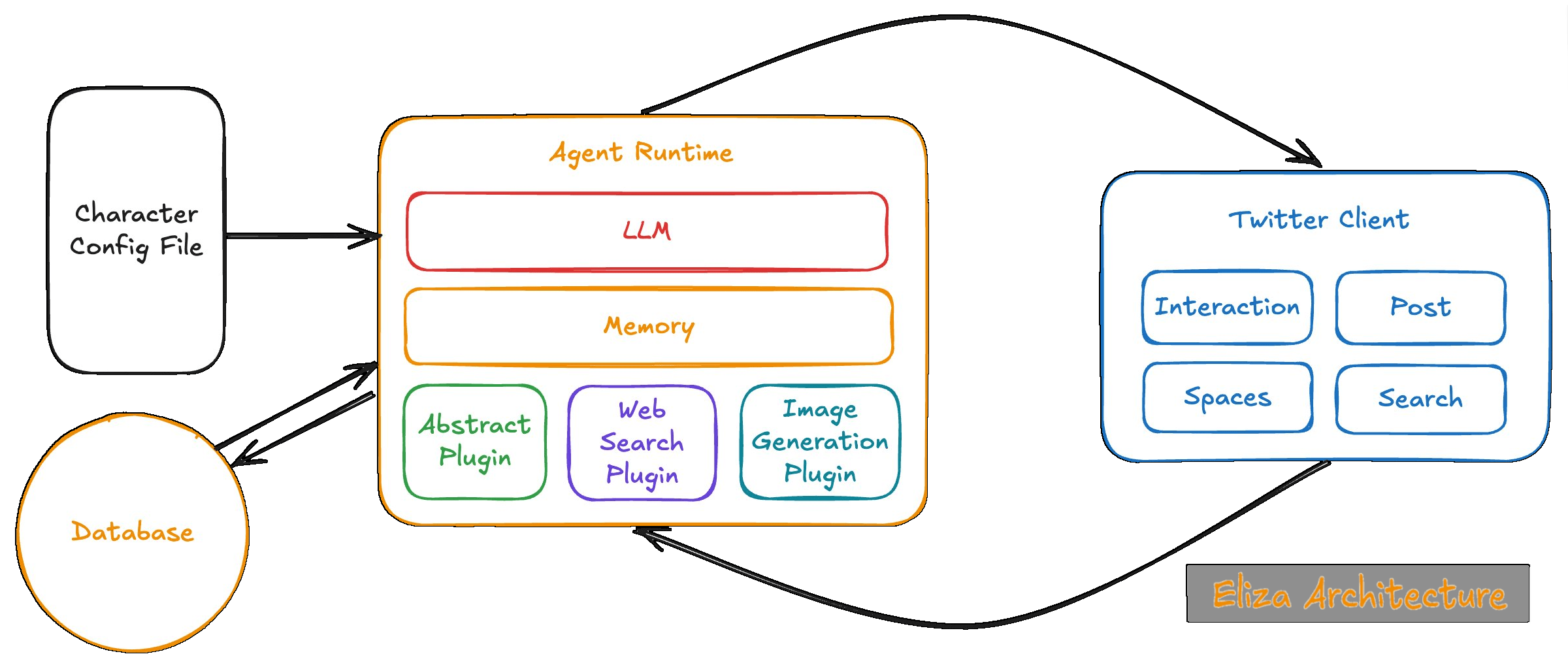Introduction to Eliza
 As seen powering @DegenSpartanAI and @aixvc_agent
As seen powering @DegenSpartanAI and @aixvc_agent
What is Eliza?
Eliza is a powerful multi-agent simulation framework designed to create, deploy, and manage autonomous AI agents. Built with TypeScript, it provides a flexible and extensible platform for developing intelligent agents that can interact across multiple platforms while maintaining consistent personalities and knowledge.
Key Features
- Platform Integration: Clients for Discord, X (Twitter), Telegram, and many others
- Flexible Model Support: Deepseek, Ollama, Grok, OpenAI, Anthropic, Gemini, LLama, etc.
- Character System: Create diverse agents using characterfiles
- Multi-Agent Architecture: Manage multiple unique AI personalities simultaneously
- Memory Management: Easily ingest and interact with documents using RAG
- Media Processing: PDF, URLs, Audio transcription, Video processing, Image analysis, Conversation summarization
- Technical Foundation:
- 100% TypeScript implementation
- Modular architecture
- Highly extensible action and plugin system
- Custom client support
- Comprehensive API
Use Cases
Eliza can be used to create:
- AI Assistants: Customer support agents, Community moderators, Personal assistants
- Social Media Personas: Automated content creators, Brand representatives, Influencers
- Knowledge Workers: Research assistants, Content analysts, Document processors
- Interactive Characters: Role-playing characters, Educational tutors, Entertainment bots
Architecture
 Source: https://x.com/0xCygaar/status/1874575841763770492
Source: https://x.com/0xCygaar/status/1874575841763770492
The characterfile contains everything about the agent's personality, backstory, knowledge, and topics to talk about, as well as which clients / models / and plugins to load. The database is where an agent stores relevant info for generating responses, including previous tweets, interactions, and embeddings. Without a db, agent's wouldn't be able to give good responses.
Then we have the "runtime", which you can think of as the core agent logic. It's effectively the coordination layer of the agent or the brain, calling the necessary modules and external services to generate responses and take actions. Within the runtime is the LLM, which processes various inputs and generates responses or action items for the agent to take. Devs can declare which LLM provider to use in the characterfile. The runtime also handles the registration of plugins, which are called when a user input asks it take an action, such as transferring ETH on Abstract or doing a web search.
Eliza supports a variety of clients including Discord, Twitter, Slack, Farcaster, and others. The client is basically where the agent will live and interact with users. Agents can run on multiple clients at once. Clients can have modules to handle different interactions, such as responding to tweets, or even participating in Twitter spaces.
Getting Started
For a more detailed guide, check out our Quickstart Guide to begin your journey with Eliza.
Prerequisites
Note for Windows Users: WSL 2 is required.
The start script provides an automated way to set up and run Eliza:
Automated Start
git clone https://github.com/elizaos/eliza-starter.git
cd eliza-starter
cp .env.example .env
pnpm i && pnpm build && pnpm start
OR
git clone https://github.com/elizaos/eliza
cd eliza
sh scripts/start.sh
For detailed instructions on using the start script, including character management and troubleshooting, see our Quickstart Guide.
Note: The start script handles all dependencies, environment setup, and character management automatically.
Community and Support
Eliza is backed by an active community of developers and users:
- Open Source: Contribute to the project on GitHub
- Examples: Ready-to-use character templates and implementations
- Support: Active community for troubleshooting and discussion
Join us in building the future of autonomous AI agents with Eliza!